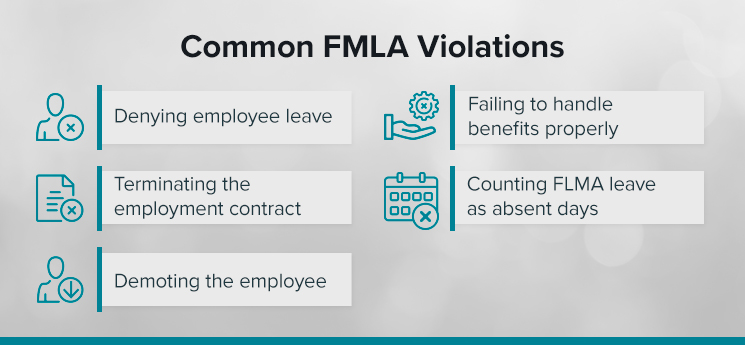Most people spend many years working, making it crucial to maintain a proper balance. Every employee deserves some time off work to attend to personal matters, whether to take care of their family members or themselves. The federal Family and Medical Leave Act (FMLA) provides that flexibility.
The FMLA establishes the requirements for getting unpaid leave and sets the rights and responsibilities of employers and employees. This guide explains those requirements, common violations and options for when an employer violates your rights. We also address some commonly asked questions to help broaden your understanding. If you have personal questions, contact the employment attorneys at Weisberg Cummings. We can help you protect your rights and interests.
What Are the FMLA Laws in Pennsylvania?
The FMLA law regulates the employer-employee relationship to the extent that an employee may take time off to attend to medical or family issues. The law applies to all 50 States, including Pennsylvania.
For example, suppose you need time off to attend to an emergency covered by the FMLA. In that case, you can do so without your employer terminating your employment contract or imposing sanctions. The caveat is that you must be eligible and have justifiable reasons for taking the leave of absence. Conversely, your employer may end your employment or impose sanctions for other distinct reasons justified under the law, such as:
- Poor performance at work
- Deliberate refusal to work
- Poor attendance record
- Disciplinary actions such as sexual harassment and discrimination
The list is not exhaustive. These violations generally constitute workplace discrimination and must be taken seriously.
In addition to FMLA, other federal laws, like the Americans with Disability Act of 1990 (ADA), Title VII of the Civil Rights Act of 1964 and the Age Discrimination in Employment Act of 1967 (ADEA), safeguard employees against discrimination.
Eligibility of FMLA in Pennsylvania
The FMLA applies to employees working for covered employers in Pennsylvania. A covered employer is one that meets the following specifications:
- A private-sector employer with a minimum of 50 employees within a 75-mile radius working at least 20 workweeks in the current or previous calendar year.
- Public agencies, regardless of the number of employees.
- Local educational institutions, irrespective of the number of employees.
Additionally, the employee should:
- Have worked for at least one year in that organization.
- Have worked a minimum of 1,250 hours within the last 12 months in that employment.
Grounds and Qualifications for FMLA in Pennsylvania
Generally, the reason for your leave of absence should relate to family and medical issues. For example, you may seek FMLA to care for the following:
- A newborn child within a year of birth
- A newly adopted child or a child placed in the foster care of the employee within one year of the placement
- A child under 18 or a child of any age with a disability that renders them incapable of self-care
- A spouse or parent with a severe medical condition
- A spouse, child or parent in active duty as a military member, where the exigency demands
- Your own serious medical condition
Notice Requirements Under FMLA Pennsylvania Laws
Under FMLA, employees must give the employer a minimum 30-day notice of their intention to take leave. This requirement usually applies when the need is foreseeable. Employers may require the employees to comply with the internal, customary policies for requesting leave unless the situation is exceptional. The employer cannot discriminate unlawfully against the employee. Employers sometimes waive the FMLA notice requirements or internal procedures regarding leave requests, which is also allowed.
The notice of intention to take leave could be verbal or written. However, written notices are advisable for evidentiary purposes. Employees are not required to specifically mention the FMLA the first time they request leave for a qualifying reason. The requirement is to provide sufficient information for the employer to know that FMLA may apply. It’s also vital to indicate the time and duration of the leave if it’s foreseeable. In other instances, inform your employer as soon as possible and fill out the necessary paperwork.
Common FMLA Violations
One of the most common FMLA violations is denying a qualified employee leave, although they have legitimate reasons. Some employers also retaliate when they disagree or find issues with employees taking leave. Improper handling of benefits and counting FMLA days as absent days could also amount to FMLA violations. Watch for these FMLA violations:
- Denying employee leave: Sometimes, employers refuse employees’ requests to take leave under FMLA, even on justifiable grounds. Such actions contradict the FMLA because you can take leave for a severe illness or injury, especially when you cannot perform your duties.
- Terminating the employment contract: Some employers dismiss employees when they exercise their rights under the FMLA. The intention of the employer does not matter in such situations. The FMLA prohibits unlawful dismissals.
- Demoting the employee: An employer cannot demote or deny you a well-deserved promotion solely because you took FMLA leave. If you have been unlawfully demoted, you have a right of restoration to be reinstated to your original or similar position.
- Failing to handle benefits properly: Your benefits or perks related to the employment should continue when you take an FMLA leave. For example, if your employer cancels your employer-sponsored health insurance coverage because you took leave, that could be a violation.
- Counting FLMA leave as absent days: FMLA leave days differ from ordinary ones. Mixing the two could affect your performance review and salary and constitute an FMLA violation, depending on the circumstances.
What to Do When Your Employer Violates Your FMLA Rights
You have several alternatives when your employer violates your FMLA rights. Each option could have distinct legal implications, so it’s best to consult an employment attorney. Here are a few examples:
- Discuss the violation with your employer: You may discuss the breach with the employer to find a resolution. They may be unaware of the breach and may be willing to rectify the wrongdoing.
- Lodge a complaint: You can file a complaint with the Wage and Hour Division of the Department of Labor (DOL) to investigate the allegations. Depending on the findings, the agency might attempt a resolution or bring an action to court to compel compliance.
- Institute a civil action: You can file a lawsuit against the employer to seek legal remedies. Examples of available remedies include reinstatement and compensation for losses. Litigation can be complex, so you should hire an attorney.
- Consider an alternate dispute resolution (ADR) mechanism: Sometimes, employers may want to settle the dispute out of court through ADR. The agreement to submit an ADR process could be made before or after the conflict. The court may also recommend that parties attempt a consensual resolution when you file a lawsuit.
In all of the instances listed above, it is essential to prepare adequately. Filing a lawsuit or complaint does not guarantee success, so you should gather credible evidence and build a solid case. Your claim should be founded in law to achieve the desired results.
Frequently Asked Questions
Below are answers to some commonly asked questions about FMLA leave in Pennsylvania:
How Long Is FMLA Leave in Pennsylvania?
The FMLA prescribes 12 work weeks of leave within 12 months for employees who fall within a qualifying category. However, you may apply for intermittent leave when needed, so you’re not obliged to take all the leave simultaneously.
You’re entitled to 26 workweeks of leave during a single 12-month period if you’re caring for a covered servicemember spouse, child, parent or next of kin who is seriously injured or ill.
Does FMLA Entitle You to Pay?
Your employer is not mandated to pay you while on leave under the FMLA. The FMLA only requires unpaid leave. Your employment arrangement may require you to use all accrued paid leave during your FMLA leave. In that situation, the paid leave may replace the unpaid leave, entitling you to receive payment.
Can Your Employer Demand Proof for Taking FMLA Leave?
Generally, your employer is entitled to evidence confirming that you are taking a leave of absence. However, your employer cannot demand certain delicate or personal information. For instance, the law prohibits your employer from insisting on medical records. He may, however, demand clarification from the medical officer.
Persons in management positions or human resources may act on behalf of your employer. The medical clearance should be credible and must satisfy the employer. Your employer must notify you in writing to provide sufficient information regarding the leave if they are unsatisfied. The request, however, must be reasonable.
What Is the 2024 Update on Paid Family Leave in Pennsylvania?
The Pennsylvanian legislature is considering a bill that provides paid family and medical leave for eligible employees. Meanwhile, in February 2024, the state government announced changes to the State Employee Assistance Program (SEAP), providing new benefits to Commonwealth employees. Under the new SEAP, eligible employees can take up to eight weeks of paid parental leave instead of six weeks as previously offered.
Consult Weisberg Cummings for Professional Assistance
An employment law attorney can guide you in filing a complaint with the DOL or commencing a civil action. Whatever the case, Weisberg Cummings is available to help you determine if you have a claim.
Weisberg Cumming is an employment law firm in Pennsylvania with over 40 years of combined experience assisting employers to safeguard their rights. We handle various personal injury and employment claims, including matters involving discrimination, sexual harassment, employment retaliation, and ADA and FMLA violations.
Request a free consultation today from Weisberg Cumming for all FMLA concerns.



